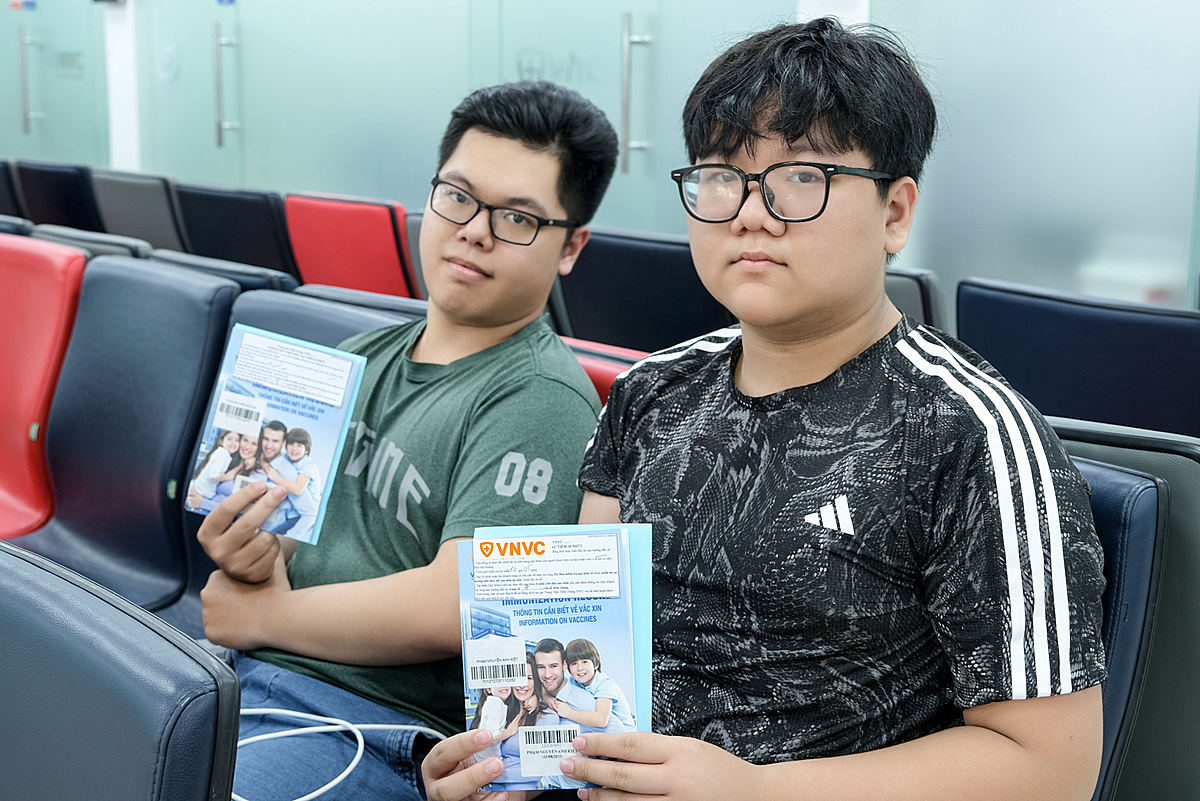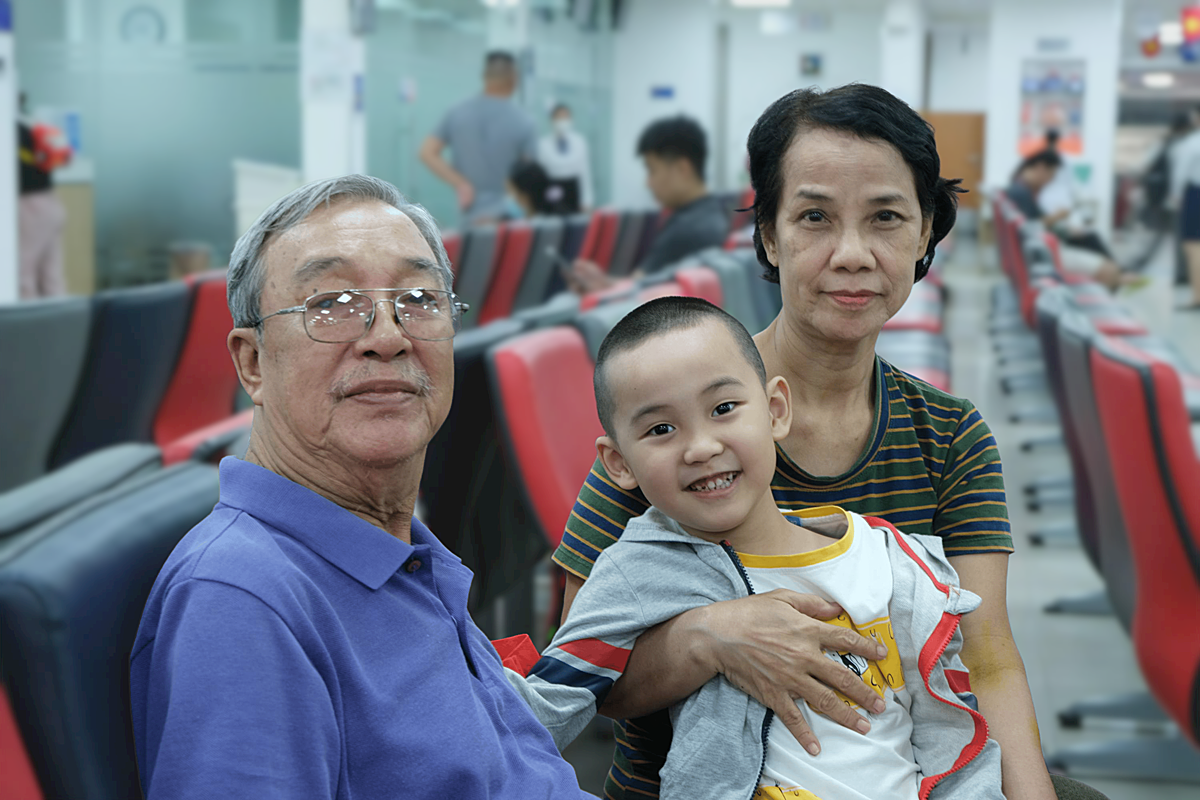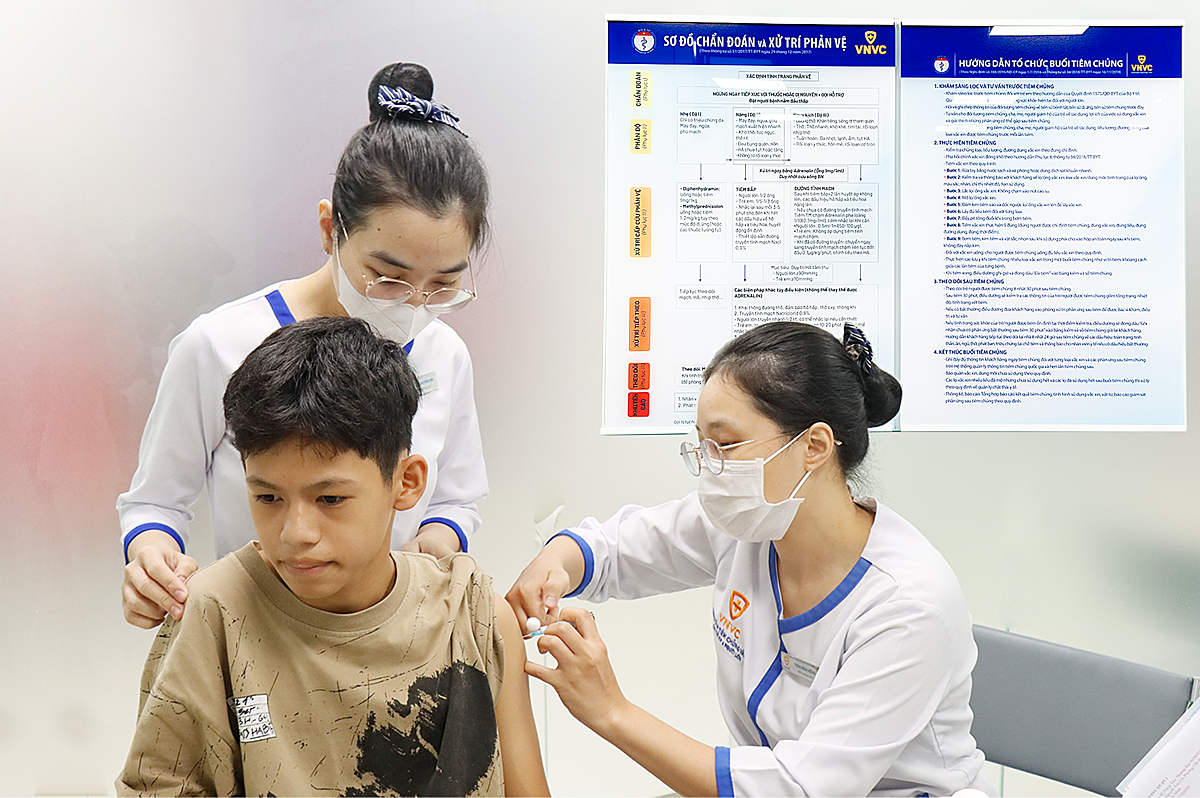The brothers attend schools with lush greenery in Ho Chi Minh City, their father explained. Despite regular mosquito control efforts, mosquitoes persist and frequently bite them, especially during summer activities, increasing their risk of illness.
"At school, it's hard for them to avoid group activities, and they sometimes don't wear long sleeves and pants, making them vulnerable to mosquito bites. We decided to get them vaccinated for peace of mind – prevention is better than cure," their father said.
 |
Anh Hao and Anh Kiet receive dengue fever vaccinations at VNVC. Photo: Moc Thao |
Anh Hao and Anh Kiet receive dengue fever vaccinations at VNVC. Photo: Moc Thao
Similarly, 5-year-old Tuoc Nguyen from Ho Chi Minh City was taken by his grandparents to get vaccinated against dengue fever before starting kindergarten. The reason being Nguyen is still young and doesn't know how to protect himself from mosquitoes or take care of himself. If he gets sick, he could become very weak. The back-to-school season coincides with the peak of the dengue fever outbreak, with cases rising in Ho Chi Minh City and the southern provinces, making Nguyen’s family even more worried.
"In the past, every time someone got dengue fever, they couldn't eat and treatment was difficult. Now that there's a vaccine, we have to take advantage of it to keep our grandson healthy, giving us peace of mind during the rainy season," Mrs. Huong shared.
Minh Nghia, 12, traveled over 100 km with his mother from Binh Phuoc to Ho Chi Minh City for a general check-up and HPV vaccination. Nghia's mother said that every year, before the start of the school year, she arranges for her son to have a check-up and general health examination. She has already had him vaccinated against influenza, measles, and other diseases. This provides her with greater peace of mind regarding her son’s health during his studies and activities at school.
Regarding HPV, she said she had heard about the virus but thought it only affected girls. After researching and consulting with doctors, she learned that the virus can be transmitted through various means besides sexual contact. When children contract the virus, the risk of genital warts and progression to cancer is higher.
"As a mother, I want to help my son eliminate any potential risks, and vaccination is an effective way to do that," she said.
 |
Grandparents take Tuoc Nguyen for vaccination at VNVC. Photo: Moc Thao |
Grandparents take Tuoc Nguyen for vaccination at VNVC. Photo: Moc Thao
According to Dr. Nguyen Tien Dao, Medical Manager at VNVC, the back-to-school period typically falls during the autumn and winter months, providing favorable conditions for many viruses and bacteria to thrive. The close contact and shared use of items in school environments, kindergartens, and dormitories increase the risk of infectious disease transmission. If one child gets sick, the disease can spread rapidly.
Children, especially preschoolers and elementary school students, are highly susceptible to infectious diseases. Their immune systems are still developing, and they lack the awareness and ability to care for themselves. Many children forget to wash their hands, readily share personal belongings, eat, and play closely together, increasing the risk of disease transmission.
Furthermore, due to academic, life, and family pressures, parents often neglect booster shots. This creates "immunity gaps" in the community, putting many children at risk of illness.
Therefore, Dr. Dao recommends that parents ensure their children are fully vaccinated before returning to school. Vaccines require 2–3 weeks to build immunity, so families should arrange vaccinations early. Some recommended vaccines include: pneumococcal, influenza, measles, mumps, rubella, tetanus, chickenpox, diphtheria, dengue fever, meningococcal, cholera, and others.
The influenza vaccine helps prevent progression to pneumonia, respiratory failure, encephalitis, myocarditis, and multiple organ failure. Children should receive an annual flu shot to stay protected against circulating flu strains as recommended by the WHO and to boost waning immunity.
 |
Minh Nghia receives the HPV vaccine at VNVC. Photo: Binh An |
Minh Nghia receives the HPV vaccine at VNVC. Photo: Binh An
Vaccines against pneumococcal disease, meningococcal disease, measles, mumps, rubella, diphtheria, pertussis (whooping cough) help prevent illness and reduce the risk of complications like pneumonia, encephalitis, meningitis, and sepsis. Depending on age and epidemiological situation, children will be given the appropriate vaccine at the vaccination center.
Children also need to be vaccinated against mosquito-borne diseases such as dengue fever and Japanese encephalitis. The dengue fever vaccine schedule consists of two doses, three months apart. For the Japanese encephalitis vaccine, the booster schedule depends on the type of vaccine previously administered. Parents should take their child to a vaccination center for a doctor's evaluation and appropriate advice.
From the age of 9, children should receive the HPV vaccine to prevent HPV-related cancers and genital diseases. If vaccinated between the ages of 9 and under 15, children only need two doses, 6 months apart, with no booster needed in adulthood.
In addition to vaccines, parents should also teach their children good personal hygiene habits, such as frequent handwashing and bathing after school. Their daily diet should include adequate micronutrients, especially vitamins A, C, and D, to strengthen immunity and resistance. If a child shows any unusual symptoms like fever, cough, or fatigue, parents should not be complacent but seek prompt medical attention for proper diagnosis and treatment.
Binh An












